情态动词和一般现在时习题
一般现在时练习题(附答案)

一、一般现在时填空题1.Look! Each of the children ________ (have) some toys in their hands.【答案】has【解析】【详解】句意:看!每一个孩子在他们的手里有一些玩具。
根据Look可知,需要用一般现在时。
主语“each of children”的核心词为each,each意为“每一个”,作主语时,谓语用单数。
have 的第三人称单数形式为has。
故填has。
2.Miss Wang says Learning English ___________ (require) action, or we’ll get nothing.【答案】requires【解析】【详解】句意:王小姐说学英语需要行动,否则我们什么也学不到。
本句是宾语从句,时态是一般现在时,主句是Miss Wang says;从句是Learning English ___________ (require) action, or we’ll get nothing。
从句是主语Learning English是动名词,谓语动词用单数;结合句意和所给单词可知答案是requires。
3.The new computer is his. He _________(own)it in fact.【答案】owns【解析】【详解】句意:这个新电脑是他的。
事实上,他拥有它。
根据前文用一般现在时,可知此处也用一般现在时。
主语he为三单,此处动词也用三单。
own“拥有”,是动词,故填owns。
4.One of the bags __________ (be) hers.【答案】is【解析】【详解】句意:其中一个包是她的。
根据语境可知,句子陈述客观事实,时态为一般现在时;one of+复数名词,作主语时,谓语动词用单数,因此用is。
故填is。
5.I never __________ (regret) my words and I believe that they will turn out useful.【答案】regret【解析】【详解】句意:我从不后悔我的话,我相信它们会有用的。
情态动词can练习题

情态动词can练习题情态动词can练习题1. I can do kungfu.2. We can sing songs.3. You can speak English.4. He can draw cartoons.5. She can play the pipa.6. They can clean the room.7. Mike can dance.8. Amy can empty the trash.9. Amy and Wu yi fan can cook the meals.10.The bird can fly.11.The ducks can swim.我是can。
我是一个情态动词,表示说话人的语气或情态,我没有人称和数的变化,在句子中不能单独作谓语,只能和紧挨着我的动词原形一起构成复合谓语。
我的基本意思是“能;会”。
一、我的基本用法1. 表示能力,意为“能;会”等。
例如:Can you speak English? 你会讲英语吗? Can you play the piano? 你会弹钢琴吗?2. 表示请求或允许,多用在口语中,意为“可以;能”等。
用于疑问句中用来提出要求,用于否定句表示不允许。
例如:Can I help you? 我能帮助你吗?You can’t playbasketball. 你不能玩篮球。
Can you...?“请你……好吗?”表示说话人的请求;Can I...?“我可以……吗?”用来征求对方是否允许自己做某事。
如在句末加上please一词就显得更有礼貌了。
例如:Can you help me, please? 请你帮助我好吗?3. 表示可能。
例如: He can be at home now. 他现在可能在家。
The moon can’t always be full. 月亮不可能常圆。
4. 表示怀疑。
在表达此意时,只能用于一般疑问句中,带有感情色彩。
例如: Can it be true? 那会是真的吗?二、我的句式变化如下:1. 在变否定句时,直接在我后加上“not”,可缩写成can’t或cannot, 但不能写成cann’t。
动词填空练习讲解 (加情态动词或助动词)

动词填空六种时态的构成及用法(1)一般现在时用法:①现在经常性的状态或动作;②客观事实和真理。
构成:①be+表语;②实义动词作谓语标志词:often, sometimes, usually, always, never,twice a month, every day/week/month/year...(every 系列)例句:He usually gets to school early.他通常很早到校。
The moon moves around the earth.月亮绕着地球转。
练一练1.认识从实践开始Knowledge practice.2.如果明天下雨,我们就不去公园了。
If it tomorrow,we to the park.【答案】1. begins with.2.rains,won’t go(2)一般过去时用法:表示过去的动作或状态。
构成:①was/were+表语;②实义动词作谓语标志词:a moment ago,just now,...ago, yesterday, last night/week/month...(last系列)例句:We went to Yunnan last Monday.上周一我们去了云南。
1.She (not visit)her aunt last weekend.2.My friend,Lucy, (study)for the math test and (practice)English last night.【答案】1.didn’t visit 2.studied practiced(3)一般将来时用法:表示将来的动作或状态。
构成:①will/shall+动词原形;②am/is/are going to+动词原形标志词:tonight, tomorrow, from now on, soon, in the future, next year...(next系列)例句:The twins will go to the cinema with their parents tonight. 这对双胞胎今晚将和他们的父母一起去看电影。
小升初时态练习题——拔高提升版

知识点睛:动词主要了解be动词、情态动词和实义动词,这里主要讲解动词在各种时态中的变化规则。
1、一般现在时:一般现在时的构成(1)be动词:主语+be(am, is, are)+其它;如:I am a boy. 我是一个男孩。
(2)行为动词:主语+行为动词(+其它);如: We study English. 我们学习英语。
注意:当主语为第三人称单数(he, she, it)时,要在动词后加“-s”或“-es”。
如:Mary likes Chinese.玛丽喜欢汉语。
动词+s的变化规则(1)一般情况下,直接加-s,如:cook-cooks, milk-milks;(2)以s. x. sh. ch. o结尾,加-es,如:guess-guesses, wash-washes,watch-watches, go-goes;(3)以“辅音字母+y”结尾,变y为i,再加-es,如:study-studies;2、一般过去时:动词的过去式的构成规则有:(1)规则动词①一般直接在动词的后面加ed:如worked , learned , cleaned , visited;②以e结尾的动词直接加d:如lived , danced , used;③以辅音字母加y结尾的动词要改y为i再加ed(此类动词较少)如study –studied carry – carried worry–worried (注意play、stay不是辅音字母加y,所以不属于此类);④双写最后一个字母(此类动词较少)如stopped;(2)不规则动词(此类词并无规则,须熟记)小学阶段要记住以下动词的原形和过去式:sing – sang , eat– ate ,see – saw , have – had , do – did , go – went , take – took , buy – bought , get –got ,read – read,fly – flew , am/is – was ,are – were , say – said ,leave – left , swim – swam , tell – told , draw – drew ,come – came , lose– lost , find – found , drink – drank , hurt –hurt , feel – felt;3、一般将来时:基本结构:(1)be going to + do;(2)will+ do. be going to = willI am going to go swimming tomorrow(明天). = I will go swimming tomorrow.4、现在进行时: am,is,are+动词现在分词;动词的ing形式的构成规则:(1)一般的直接在后面加上ing ,如doing , going , working , singing ,eating;(2)以e 结尾的动词,要先去e再加ing,如having , writing;(3)双写最后一个字母的(此类动词极少)有:running , swimming ,sitting , getting;知识点冲刺训练一、单项选择1.( )She ____ curly black hair and ____ glasses.A.wear; hasB.has; wearC.has; wears2.( )We're going to ____ the Eiffel Tower.A.lookB.watchC.see3.( )My mother ____ me ____ my school by car every day.A.took; toB.takes; toC.takes; for4.( )He ____ English because he was ill.A.didn't go to studyB.doesn't go to studyC.went to study5.( )—____ your father ____ at home?—No, he ____ in a factory.A.Is; work; workB.Does; work; worksC.Is; works; works6.( )—I ____ a present for you.—Thanks a lot.A.gaveB.sentC.bought7.( )—What ____ he look like?—He is tall.A.isB.doesC.are8.( )—Where are the students?—____ in the playground.A.She'sB.There areC.They're9.( )____, everyone. The floor is very wet.A.Watch outB.Look oute outD.Make out 10.( )There ____ any people on the farm yesterday afternoon.A.isn'tB.wereC.weren't二、句型转换11.按要求完成句子(每空一词)。
(完整版)一般现在时练习题附答案解析
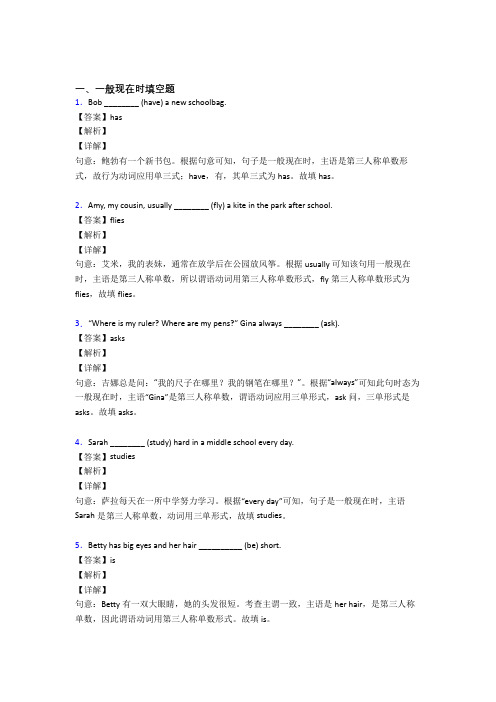
一、一般现在时填空题1.Bob ________ (have) a new schoolbag.【答案】has【解析】【详解】句意:鲍勃有一个新书包。
根据句意可知,句子是一般现在时,主语是第三人称单数形式,故行为动词应用单三式;have,有,其单三式为has。
故填has。
2.Amy, my cousin, usually ________ (fly) a kite in the park after school.【答案】flies【解析】【详解】句意:艾米,我的表妹,通常在放学后在公园放风筝。
根据usually可知该句用一般现在时,主语是第三人称单数,所以谓语动词用第三人称单数形式,fly第三人称单数形式为flies,故填flies。
3.“Where is my ruler? Where are my pens?” Gina always ________ (ask).【答案】asks【解析】【详解】句意:吉娜总是问:“我的尺子在哪里?我的钢笔在哪里?”。
根据“always”可知此句时态为一般现在时,主语“Gina”是第三人称单数,谓语动词应用三单形式,ask问,三单形式是asks。
故填asks。
4.Sarah ________ (study) hard in a middle school every day.【答案】studies【解析】【详解】句意:萨拉每天在一所中学努力学习。
根据“every day”可知,句子是一般现在时,主语Sarah是第三人称单数,动词用三单形式,故填studies。
5.Betty has big eyes and her hair __________ (be) short.【答案】is【解析】【详解】句意:Betty有一双大眼睛,她的头发很短。
考查主谓一致,主语是her hair,是第三人称单数,因此谓语动词用第三人称单数形式。
故填is。
6.The little girl ________ (dress) herself every morning.【答案】dresses【解析】【详解】句意:那个小女孩每天给自己穿衣服。
英语语法一般现在时,结构,用法全打尽!(附习题)
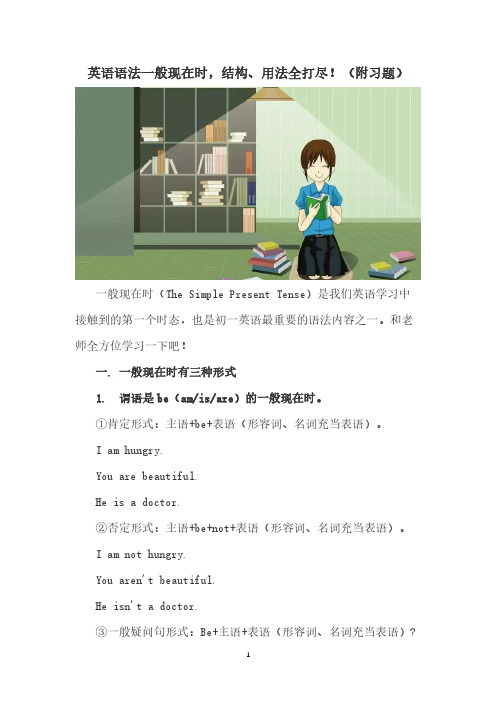
英语语法一般现在时,结构、用法全打尽!(附习题)一般现在时(The Simple Present Tense)是我们英语学习中接触到的第一个时态,也是初一英语最重要的语法内容之一。
和老师全方位学习一下吧!一. 一般现在时有三种形式1. 谓语是be(am/is/are)的一般现在时。
①肯定形式:主语+be+表语(形容词、名词充当表语)。
I am hungry.You are beautiful.He is a doctor.②否定形式:主语+be+not+表语(形容词、名词充当表语)。
I am not hungry.You aren't beautiful.He isn't a doctor.③一般疑问句形式:Be+主语+表语(形容词、名词充当表语)?肯定回答:Yes,主语+be. 否定回答:No, 主语+ be+not.—Are you hungry?—Yes,I am./No,I'm not.—Is he a doctor?—Yes, he is./No, he isn,t.④特殊疑问句形式:特殊疑问词+Be开头的一般疑问句?—What is he?—He is a doctor.注意:be要随着主语变。
2. 谓语动词是实义动词(及物动词或不及物动词)的一般现在时。
①肯定形式:“主语+及物动词+宾语”或“主语+不及物动词”。
She has a little brother.她有一个弟弟。
The sun rises in the east.太阳从东方升起。
②否定形式:“主语+don't/doesn't+及物动词+宾语”或“主语+don't/doesn't+不及物动词”。
She doesn't have a little brother.她没有弟弟。
I don't eat every morning.我每天早晨都不吃饭。
③一般疑问句形式:“Do/Does+主语+及物动词原形+宾语”或“Do/Does+主语+不及物动词原形”。
一般现在时专项练习题及答案
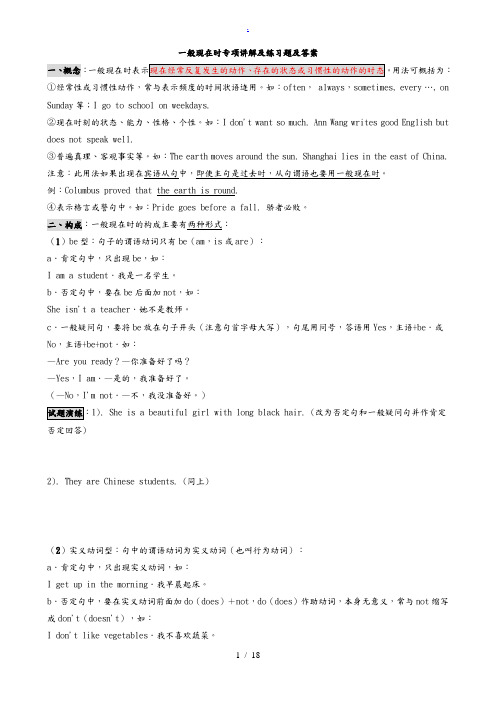
一般现在时专项讲解及练习题及答案一、概念:用法可概括为:①经常性或习惯性动作,常与表示频度的时间状语连用。
如:often, always,sometimes, every …, on Sunday等;I go to school on weekdays.②现在时刻的状态、能力、性格、个性。
如:I don't want so much. Ann Wang writes good English but does not speak well.③普遍真理、客观事实等。
如:The earth moves around the sun. Shanghai lies in the east of China. 注意:此用法如果出现在宾语从句中,即使主句是过去时,从句谓语也要用一般现在时。
例:Columbus proved that the earth is round.④表示格言或警句中。
如:Pride goes before a fall. 骄者必败。
二、构成:一般现在时的构成主要有两种形式:(1)be型:句子的谓语动词只有be(am,is或are):a.肯定句中,只出现be,如:I am a student.我是一名学生。
b.否定句中,要在be后面加not,如:She isn't a teacher.她不是教师。
c.一般疑问句,要将be放在句子开头(注意句首字母大写),句尾用问号,答语用Yes,主语+be.或No,主语+be+not.如:—Are you ready?—你准备好了吗?—Yes,I am.—是的,我准备好了。
(—No,I'm not.—不,我没准备好。
)1). She is a beautiful girl with long black hair. (改为否定句和一般疑问句并作肯定否定回答)2). They are Chinese students. (同上)(2)实义动词型:句中的谓语动词为实义动词(也叫行为动词):a.肯定句中,只出现实义动词,如:I get up in the morning.我早晨起床。
一般现在时练习题(附答案)

一、一般现在时填空题1.It usually ______ (take) me two hours to do my homework every day.【答案】takes【解析】【详解】句意:我通常每天花两个小时做作业。
根据every day可知此句时态是一般现在时。
结合句意和所给词可知答案是takes。
故填takes。
2.Lily ________ (not do) her homework after supper on Sundays.【答案】doesn’t do【解析】【详解】句意:Lily在周日下午晚饭后不做她的家庭作业。
根据on Sundays可判断本句使用一般现在时态,根据所给词可知do为实义动词“做”,且本句要求改为否定句,故在句中添加助动词来完成否定句,因为主语Lily为单三形式,故使用助动词does,故答案为doesn’t do.3.Alan ________ (study) English every day.【答案】studies【解析】【详解】句意:艾伦每天都学英语。
根据“every day”可知,句子时态为一般现在时,因为“Alan”主语为第三人称单数,故填studies。
4.The old man _________ (own) five shops.【答案】owns【解析】【详解】句意:这位老人有五家商店。
句子陈述事实,应用一般现在时,主语是单数名词,动词用三单形式,故填owns。
5.The new computer is his. He _________(own)it in fact.【答案】owns【解析】【详解】句意:这个新电脑是他的。
事实上,他拥有它。
根据前文用一般现在时,可知此处也用一般现在时。
主语he为三单,此处动词也用三单。
own“拥有”,是动词,故填owns。
6.________ (sound) like you are having a good time.【答案】(S)ounds【解析】【详解】句意:听起来你玩得很开心。
(完整版)一般现在时练习题含答案
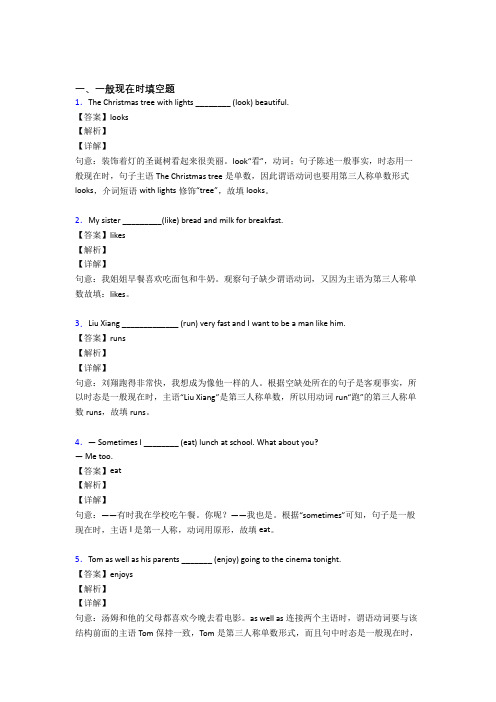
一、一般现在时填空题1.The Christmas tree with lights ________ (look) beautiful.【答案】looks【解析】【详解】句意:装饰着灯的圣诞树看起来很美丽。
look“看”,动词;句子陈述一般事实,时态用一般现在时,句子主语The Christmas tree是单数,因此谓语动词也要用第三人称单数形式looks,介词短语with lights修饰“tree”,故填looks。
2.My sister _________(like) bread and milk for breakfast.【答案】likes【解析】【详解】句意:我姐姐早餐喜欢吃面包和牛奶。
观察句子缺少谓语动词,又因为主语为第三人称单数故填:likes。
3.Liu Xiang _____________ (run) very fast and I want to be a man like him.【答案】runs【解析】【详解】句意:刘翔跑得非常快,我想成为像他一样的人。
根据空缺处所在的句子是客观事实,所以时态是一般现在时,主语“Liu Xiang”是第三人称单数,所以用动词run“跑”的第三人称单数runs,故填runs。
4.— Sometimes I ________ (eat) lunch at school. What about you?— Me too.【答案】eat【解析】【详解】句意:——有时我在学校吃午餐。
你呢?——我也是。
根据“sometimes”可知,句子是一般现在时,主语I是第一人称,动词用原形,故填eat。
5.Tom as well as his parents _______ (enjoy) going to the cinema tonight.【答案】enjoys【解析】【详解】句意:汤姆和他的父母都喜欢今晚去看电影。
as well as连接两个主语时,谓语动词要与该结构前面的主语Tom保持一致,Tom是第三人称单数形式,而且句中时态是一般现在时,强调“事实”,所以谓语动词用第三人称单数形式。
小学英语语法时态归纳及练习(含答案解析)

英语时态归纳一、一般现在时:标志词:often(经常) sometimes(有时) always(总是) usually(通常) never(从不) every(每一)行为动词词型变化形式:一般现在时动词只有第三人称有词形变化;其他人称(第一人称:I, we;第二人称:you;第三人称复数:they、my friends)动词均用原形。
当主语是第三人称单数时,一般动词在一般现在时句子中的变化规律:1、多数在动词后加s:play—plays like—likes ,2、以s,x,sh,ch,o结尾的动词加es wash–washes catch–catches do–does3、以辅音字母加y结尾,把y改i再加es fly—flies study—studies4、以元音字母加y结尾,直接加s buy – buys5、不规则变化have—has一般现在时基本用法功能1.表示事物或人物的特征、状态。
如:The sky is blue.天空是蓝色的。
2.表示经常性或习惯性的动作。
如:I get up at six every day.我每天六点起床。
3.表示客观现实。
如:The earth goes around the sun.地球绕着太阳转。
The earth is round.构成1. be动词:主语+be(am,is,are)+其它。
如:I am a boy.我是一个男孩。
2.行为动词:主语+行为动词(+其它)。
如:We study English.我们学习英语。
句型肯定句:A.be动词:主语+ be + 其它成分He is a worker.B.行为动词:主语+动词(注意人称变化) +其它成分We like the little cat.否定句:A.be动词:主语+ be + not+其它成分They are not students.B.行为动词:主语+助动词(do/does) + not+动词原形+其它成分We don’t like the little cat.一般疑问句:A.be动词:Am / Is /Are +主语+ 其它成分Are you a teacher? Yes, I am. / No, I am not.Are they students of your school. Yes, they are / No they aren’t.B.行为动词:助动词(Do/Does)+主语+动词原形+ 其它成分Do you like it? Yes, I do. / No. I don’t .Does he(she) like it? Yes, he( she )does. / No, he ( she )doesn’t.特殊疑问句:疑问词+ 一般疑问句A.be动词:How many students are there in your school?B.行为动词:What do you usually do on Sunday?一般现在时动词be和have的变化形式1.动词Be 叫连系动词, 用法:第一人称单数用am,第三人称单数用is,其它人称用are。
高中英语时态练习题

高中英语时态练习题1. 一般现在时:请将下列句子转换为一般现在时。
- 原句:She is going to the library this afternoon.- 转换:She goes to the library every afternoon.2. 一般过去时:根据上下文,选择正确的动词形式填空。
- 原句:Yesterday, I (go) to the beach with my friends.- 填空:Yesterday, I went to the beach with my friends.3. 一般将来时:使用正确的时态完成句子。
- 原句:I (visit) my grandparents next weekend.- 完成:I will visit my grandparents next weekend.4. 现在进行时:将下列句子转换为现在进行时。
- 原句:He is reading a book now.- 转换:He is reading a book now.5. 过去进行时:根据上下文,选择正确的动词形式填空。
- 原句:At 9 o'clock last night, she (watch) a movie.- 填空:At 9 o'clock last night, she was watching a movie.6. 将来进行时:使用正确的时态完成句子。
- 原句:By this time tomorrow, they (fly) to New York.- 完成:By this time tomorrow, they will be flying to New York.7. 现在完成时:将下列句子转换为现在完成时。
- 原句:He has finished his homework.- 转换:He has finished his homework.8. 过去完成时:根据上下文,选择正确的动词形式填空。
初中语法:情态动词知识点练习题

初中语法:情态动词知识点练习题一、情态动词单项选择题1.—Shall I tell him the change of the time right now?—I’m afraid you ________, otherwise he will be late for the meeting.A.can B.may C.must D.need【答案】C【解析】【详解】句意:——我现在就告诉他时间改变了,好吗?——恐怕你必须这么做,否则他开会就要迟到了。
考查情态动词辨析。
can能够,表能力或许可;may可以,表推测;must必须;need需要。
根据下文“otherwise he will be late for the meeting”,可知ABD三项不合语境,这里是说必须告诉他时间改了,故选C。
2.—I went to Mount Wudang last week. But there were too many people and it’s too hot.—It’s too bad. I think your trip ________ be unpleasant.A.c an’t B.should C.must D.need【答案】C【解析】【分析】【详解】句意:——我上周去了武当山。
但是人太多了,天气太热了。
——太糟糕了。
我想你的旅行一定很不愉快。
考查情态动词。
can’t不能;should应该;must一定;need需要。
根据“But there were too many people and it’s too hot.”判断,此次旅行一定是不愉快的,表示肯定的推测,用must be。
故选C。
3.________ you raise yo ur feet off the floor? I’d like to see if my pen is under the desk. A.Must B.Can C.Should D.May【答案】B【解析】【分析】【详解】句意:你可以把脚抬离地面吗?我想看看我的钢笔是否在课桌下面。
一般现在时练习题(及答案)
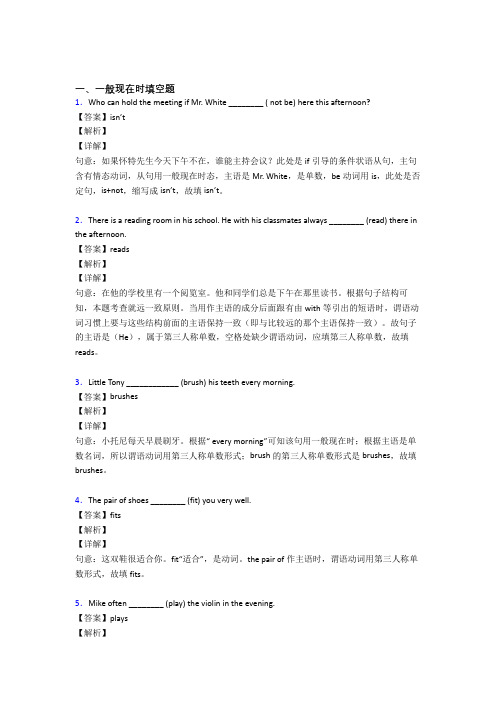
一、一般现在时填空题1.Who can hold the meeting if Mr. White ________ ( not be) here this afternoon?【答案】isn’t【解析】【详解】句意:如果怀特先生今天下午不在,谁能主持会议?此处是if引导的条件状语从句,主句含有情态动词,从句用一般现在时态,主语是Mr. White,是单数,be动词用is,此处是否定句,is+not,缩写成isn’t,故填isn’t。
2.There is a reading room in his school. He with his classmates always ________ (read) there in the afternoon.【答案】reads【解析】【详解】句意:在他的学校里有一个阅览室。
他和同学们总是下午在那里读书。
根据句子结构可知,本题考查就远一致原则。
当用作主语的成分后面跟有由with等引出的短语时,谓语动词习惯上要与这些结构前面的主语保持一致(即与比较远的那个主语保持一致)。
故句子的主语是(He),属于第三人称单数,空格处缺少谓语动词,应填第三人称单数,故填reads。
3.Little Tony ____________ (brush) his teeth every morning.【答案】brushes【解析】【详解】句意:小托尼每天早晨刷牙。
根据“ every morning”可知该句用一般现在时;根据主语是单数名词,所以谓语动词用第三人称单数形式;brush的第三人称单数形式是brushes,故填brushes。
4.The pair of shoes ________ (fit) you very well.【答案】fits【解析】【详解】句意:这双鞋很适合你。
fit“适合”,是动词。
the pair of作主语时,谓语动词用第三人称单数形式,故填fits。
(英语)英语一般现在时练习题20篇含解析

(英语)英语一般现在时练习题20篇含解析一、初中英语一般现在时1.Xiao Ming never ________ home on foot. She often takes the subway.A. go toB. goes toC. walksD. goes【答案】 D【解析】【分析】句意:小明从不不行回家,他经常乘地铁。
词组:go home回家。
主语Xiao Ming 是第三人称单数,故用动词后加-s,因此选D。
【点评】考查一般现在时的第三人称单数形式。
2.Millions of people _________ the Great wall every year.A. visitedB. visitC. will visitD. are vesting 【答案】 B【解析】【分析】句意:成千万的人每年参观长城。
根据every year,可知句子时态为一般现在时,故答案是B。
【点评】考查一般现在时,注意根据时间状语确定句子的时态。
3.She _____ out alone at night.A. dare not to goB. dares not goC. doesn't dare to goD. doesn't dares go【答案】 C【解析】【分析】句意:晚上她不敢一个人出去。
dare可以作情态动词也可以作行为动词,作情态动词时,后面直接跟动词原形,没有人称与数的变化,构成否定时直接在dare 后加not,作行为动词时后跟动词不定式,构成否定需要助动词,故答案是C。
【点评】考查dare的用法,注意dare做情态动词和行为动词的用法上的区别。
4.If he _____ the money, he _____ a lot of clothes.A. has; will buyB. had; boughtC. had; would buyD. had; will buy 【答案】 A【解析】【分析】句意:如果他有钱,他会买许多衣服。
时态语态高中练习题及讲解

时态语态高中练习题及讲解### 时态语态高中练习题及讲解#### 练习题1. 一般现在时:请用一般现在时翻译下列句子。
- 他每天早晨跑步。
- 地球绕着太阳转。
2. 一般过去时:将下列句子转换为一般过去时。
- 我昨天去了图书馆。
- 他们去年在这个城市买了房子。
3. 一般将来时:使用一般将来时构造以下句子。
- 明天我会去看电影。
- 她下个月将会参加一个会议。
4. 现在进行时:根据给定的动词,构造现在进行时的句子。
- 她正在学习。
- 他们正在讨论。
5. 过去进行时:将下列句子转换为过去进行时。
- 昨天这个时候,我正在看电视。
- 昨晚,他们正在准备晚餐。
6. 现在完成时:使用现在完成时描述以下情况。
- 我已经完成了我的作业。
- 他们还没有到达。
7. 过去完成时:构造过去完成时的句子。
- 我到达的时候,电影已经开始了。
- 她告诉我她已经完成了她的报告。
8. 被动语态:将下列句子转换为被动语态。
- 他们正在建造一座新桥。
- 这本书是由著名作家写的。
9. 情态动词:使用情态动词表达可能性或能力。
- 他可能已经离开了。
- 她能够解决这个问题。
10. 条件句:构造条件句。
- 如果明天下雨,我们就不去野餐了。
- 要是我有时间,我会去参观博物馆。
#### 讲解1. 一般现在时:用来描述经常发生的动作或状态,以及普遍真理。
- He runs every morning.- The Earth revolves around the Sun.2. 一般过去时:用来描述过去发生的动作或状态。
- I went to the library yesterday.- They bought a house in this city last year.3. 一般将来时:用来描述将要发生的动作或状态。
- I will go to the movies tomorrow.- She will attend a meeting next month.4. 现在进行时:用来描述正在发生的动作。
初一英语情态动词试题答案及解析
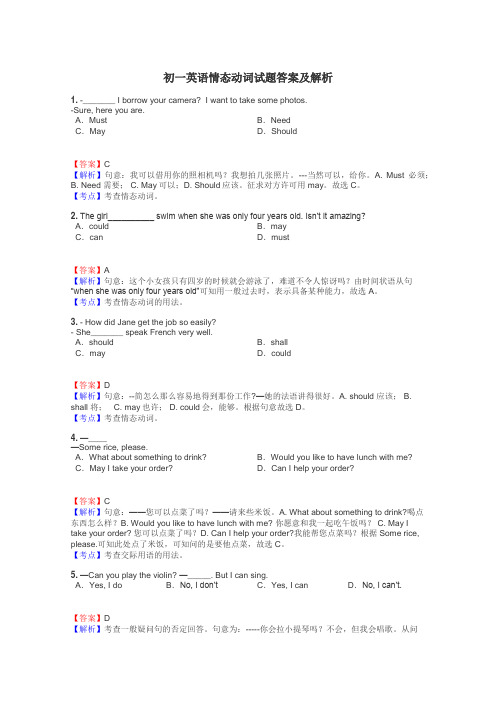
初一英语情态动词试题答案及解析1. -_______ I borrow your camera? I want to take some photos.-Sure, here you are.A.Must B.NeedC.May D.Should【答案】C【解析】句意:我可以借用你的照相机吗?我想拍几张照片。
---当然可以,给你。
A. Must必须;B. Need 需要;C. May可以;D. Should应该。
征求对方许可用may。
故选C。
【考点】考查情态动词。
2.The girl__________ swim when she was only four years old. Isn’t it amazing?A.could B.mayC.can D.must【答案】A【解析】句意:这个小女孩只有四岁的时候就会游泳了,难道不令人惊讶吗?由时间状语从句“when she was only four years old”可知用一般过去时,表示具备某种能力,故选A。
【考点】考查情态动词的用法。
3. - How did Jane get the job so easily?- She_______ speak French very well.A.should B.shallC.may D.could【答案】D【解析】句意:--简怎么那么容易地得到那份工作?—她的法语讲得很好。
A. should 应该; B. shall 将; C. may也许; D. could会,能够。
根据句意故选D。
【考点】考查情态动词。
4.—____—Some rice, please.A.What about something to drink?B.Would you like to have lunch with me? C.May I take your order?D.Can I help your order?【答案】C【解析】句意:——您可以点菜了吗?——请来些米饭。
高考英语情态动词讲解及习题(附答案)
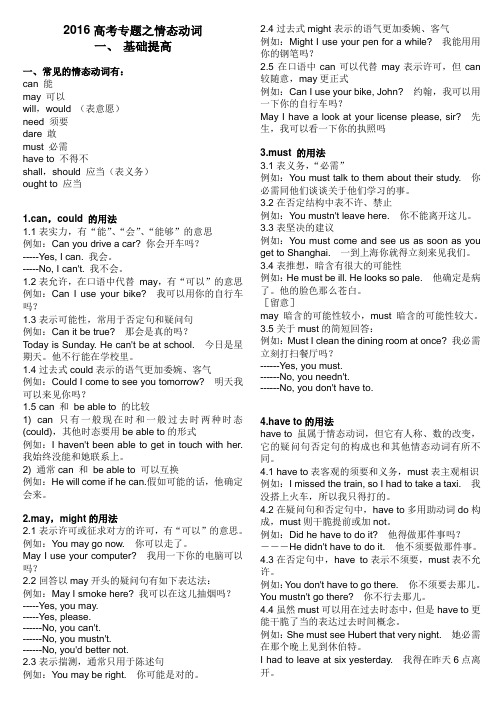
2016高考专题之情态动词一、基础提高一、常见的情态动词有:can 能may 可以will,would (表意愿)need 须要dare 敢must 必需have to 不得不shall,should 应当(表义务)ought to 应当1.can,could 的用法1.1表实力,有“能”、“会”、“能够”的意思例如:Can you drive a car? 你会开车吗?-----Yes, I can. 我会。
-----No, I can't. 我不会。
1.2表允许,在口语中代替may,有“可以”的意思例如:Can I use your bike?我可以用你的自行车吗?1.3表示可能性,常用于否定句和疑问句例如:Can it be true?那会是真的吗?Today is Sunday. He can't be at school.今日是星期天。
他不行能在学校里。
1.4过去式could表示的语气更加委婉、客气例如:Could I come to see you tomorrow?明天我可以来见你吗?1.5 can 和be able to 的比较1) can 只有一般现在时和一般过去时两种时态(could),其他时态要用be able to的形式例如:I haven't been able to get in touch with her.我始终没能和她联系上。
2) 通常can 和be able to 可以互换例如:He will come if he can.假如可能的话,他确定会来。
2.may,might的用法2.1表示许可或征求对方的许可,有“可以”的意思。
例如:You may go now.你可以走了。
May I use your computer?我用一下你的电脑可以吗?2.2回答以may开头的疑问句有如下表达法:例如:May I smoke here? 我可以在这儿抽烟吗?-----Yes, you may.-----Yes, please.------No, you can't.------No, you mustn't.------No, you'd better not.2.3表示揣测,通常只用于陈述句例如:You may be right.你可能是对的。
一般现在时 习题附答案
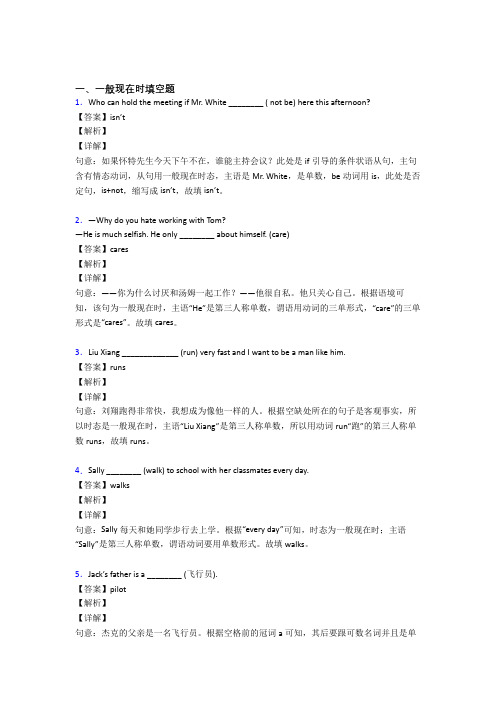
一、一般现在时填空题1.Who can hold the meeting if Mr. White ________ ( not be) here this afternoon?【答案】isn’t【解析】【详解】句意:如果怀特先生今天下午不在,谁能主持会议?此处是if引导的条件状语从句,主句含有情态动词,从句用一般现在时态,主语是Mr. White,是单数,be动词用is,此处是否定句,is+not,缩写成isn’t,故填isn’t。
2.—Why do you hate working with Tom?—He is much selfish. He only ________ about himself. (care)【答案】cares【解析】【详解】句意:——你为什么讨厌和汤姆一起工作?——他很自私。
他只关心自己。
根据语境可知,该句为一般现在时,主语“He”是第三人称单数,谓语用动词的三单形式,“care”的三单形式是“cares”。
故填cares。
3.Liu Xiang _____________ (run) very fast and I want to be a man like him.【答案】runs【解析】【详解】句意:刘翔跑得非常快,我想成为像他一样的人。
根据空缺处所在的句子是客观事实,所以时态是一般现在时,主语“Liu Xiang”是第三人称单数,所以用动词run“跑”的第三人称单数runs,故填runs。
4.Sally ________ (walk) to school with her classmates every day.【答案】walks【解析】【详解】句意:Sally每天和她同学步行去上学。
根据“every day”可知,时态为一般现在时;主语“Sally”是第三人称单数,谓语动词要用单数形式。
故填walks。
5.Jack’s father is a ________ (飞行员).【答案】pilot【解析】【详解】句意:杰克的父亲是一名飞行员。
一般现在时练习题(及答案)
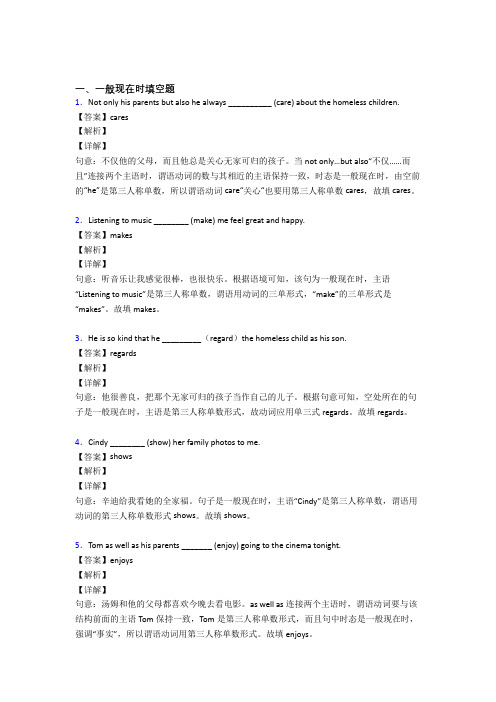
一、一般现在时填空题1.Not only his parents but also he always __________ (care) about the homeless children.【答案】cares【解析】【详解】句意:不仅他的父母,而且他总是关心无家可归的孩子。
当not only…but also“不仅……而且”连接两个主语时,谓语动词的数与其相近的主语保持一致,时态是一般现在时,由空前的“he”是第三人称单数,所以谓语动词care“关心“也要用第三人称单数cares,故填cares。
2.Listening to music ________ (make) me feel great and happy.【答案】makes【解析】【详解】句意:听音乐让我感觉很棒,也很快乐。
根据语境可知,该句为一般现在时,主语“Listening to music”是第三人称单数,谓语用动词的三单形式,“make”的三单形式是“makes”。
故填makes。
3.He is so kind that he _________(regard)the homeless child as his son.【答案】regards【解析】【详解】句意:他很善良,把那个无家可归的孩子当作自己的儿子。
根据句意可知,空处所在的句子是一般现在时,主语是第三人称单数形式,故动词应用单三式regards。
故填regards。
4.Cindy ________ (show) her family photos to me.【答案】shows【解析】【详解】句意:辛迪给我看她的全家福。
句子是一般现在时,主语“Cindy”是第三人称单数,谓语用动词的第三人称单数形式shows。
故填shows。
5.Tom as well as his parents _______ (enjoy) going to the cinema tonight.【答案】enjoys【解析】【详解】句意:汤姆和他的父母都喜欢今晚去看电影。
(完整版)一般现在时练习题

一、一般现在时填空题1.People always say, “If winter ________ (come), can spring be far behind?”【答案】comes【解析】【详解】句意:人们常说:“冬天来了,春天还会远吗?”come来;分析句子结构,本句是直接引语,引语是if条件句,主句含有情态动词can,从句需用一般现在时代替一般将来时;结合winter是单数第三人称,可知动词come需用三单形式。
故填comes。
2.We ________(celebration) the Dragon Boat Festival to remember Qu Yuan.【答案】celebrate【解析】【详解】句意:我们过端午节是为了纪念屈原。
此空缺少动词作谓语成分,celebration对应的动词是celebrate“庆祝”,陈述客观事实,句子用一般现在时,主语是复数形式,动词用原形,故填celebrate。
3.There _________ (be) some orange juice in the glass.【答案】is【解析】【详解】句意:玻璃杯里有一些橙汁。
根据句意可知,句子是一般现在时,主语“some orange juice”是第三人称单数形式,故be用is。
故填is。
4.Mr. Smith _________ (teach) us English. He is a funny man. We all like him.【答案】teaches【解析】【详解】句意:Smith先生教我们英语。
他是一个很有趣的人。
我们都很喜欢他。
分析句子可知,此句为一般现在时。
主语Mr. Smith为第三人称,因此谓语动词用单数。
故填teaches。
5.Sarah ________ (study) hard in a middle school every day.【答案】studies【解析】【详解】句意:萨拉每天在一所中学努力学习。
- 1、下载文档前请自行甄别文档内容的完整性,平台不提供额外的编辑、内容补充、找答案等附加服务。
- 2、"仅部分预览"的文档,不可在线预览部分如存在完整性等问题,可反馈申请退款(可完整预览的文档不适用该条件!)。
- 3、如文档侵犯您的权益,请联系客服反馈,我们会尽快为您处理(人工客服工作时间:9:00-18:30)。
情态动词练习题1. Mr. Wang ______ be in Nanjing now, he went to Beijingonly this morning.A. mustn’tB. may notC. can’tD. needn’t2. –Must I stay at home, Mum?--No, you ______.A. needn’tB. mustn’tC. don’tD. may not3. –Can you go swimming with us this afternoon?--Sorry, I can’t. I _____ take care of my little sister at home because my mother is ill.A. canB. mayC. wouldD. have to4. –May I go to the cinema, Mum? --Certainly. But you ______be back by 11 o’clock.A. canB. mayC. mustD. need5. To make our city more beautiful, rubbish ______ into the river.A. needn’t be thrownB. mustn’t be thrownC. can’t throwD. may not throw6. –May I go out to play basketball, Dad?--No, you ______.Youmust finish your homework first.A. mustn’tB. may notC. couldn’tD. needn’t7. –Where is Jack, please ?--He _____ be in the reading room.A. canB. needC. wouldD. must8. –Who is the man over there? Is it Mr Li?--No, it ______ be him.Mr Li is much taller.A. mustn’tB. may notC. can’tD. needn’t9. These books ______ out of the reading room. You have toread them here.A. can’t takeB. must be takenC. can takeD. mustn’t be taken10. –Mum, may I watch TV now?--Sure, but you ______ helpme with my housework first.A. canB. mayC. mustD. could11. The boy said he had to speak English in class, but he ______speak it after class.Have to /had to/has to 不得不A. couldB. didn’t have to (不必)C. mightD. shouldn’t12. –Must we hand in the papers now? --No, you ______.A. can’tB. may notC. mustn’tD. needn’t Hand in 上交,递交13. John ______ go there with us tonight, but he isn’t very sure about it.A. mustB. canC. willD. may14. Even the top students in our class can’t work out this problem.So it ______ be very difficult.Work out 弄明白、做出来A. canB. mayC. mustD. need15. Put on more clothes. You ______ be feeling cold with only a shirt on. Put on 穿上A. canB. couldC. wouldD. must16. It’s still early. You ______.A. mustn’t hurryB. wouldn’t hurryC. may not hurryD. don’t have to hurry17. –May I stop here?--No, you ______.A. mustn’tB. might notC.needn’tD. won’t18. A computer ______ think for itself, it must be told what to do.A. can’tB. couldn’tC. may notD. might not19. –Could I borrow your dictionary?-- Yes, of course you _______.A. mightB. willC. canD. should20. Peter ______ come with us tonight, but he isn’t very sure yet. ——come with sb. 跟某人来A. mustB. mayC. canD. will21. Michael ______ be a policeman, for he’s much too short.A. needn’tB. can’tC. shouldD. may22. ______ I know your name?A. MayB. WillC. ShallD. Must23. You ______ be more careful next time.A. have toB. mayC. mustD. might24. You ______ miss the lesson, though we ______ have it on Thursday.A. mustn’t; needn’tB. needn’t; mustn’tC. mustn’t; mustn’tD.needn’t; needn’t25. This pen looks like mine, yet it isn’t. whose ______ it be?A. mustB. mayC. wouldD. can26. What kinds of homes will we live in the future? Nobody ______be sure, but scientists are working out new ideas now.be doing sth.正在做某事work out 解决、研究得出kinds of(各种各样)A. willB. mayC. canD. must27. I ______ like to know where you were born.A. shallB. shouldC. doD. may28. ______ you be happy!A. MightB. MustC. WishD. May29. A teacher ______ do every exercise, but a student must.A. may notB. needn’tC. can’tD. mustn’t30. The matter ______ be changed into a gas, but it _______ be heated to its boiling point.A. may; needn’tB. may; canC.mustn’t; needn’tD. can; must31. Teachers and students ______ look coldly at you for a day or two,but there are friendly feelings in their hearts.A. mustB. canC. mayD. should32. Cars and buses ______ stop when the traffic lights turn red.A. canB. needC. mayD. must33. –Do you think his story ______ true?--I don’t think so. But it sounds good.A. must beB. may beC. can beD. has to be34. Look out! The knife is very sharp. You ______ cut your finger.A. needB. mustC. shouldD. may35. –How long ______ the book be kept?--For two weeks, but you ______ return it on time.A. can; mayB. may; needC. can; mustD. must; need36. –May I have an apple, Mum?--Certainly. But you ______wash your hands first?A. mayB. mustC. canD. need37. –There is a lot of smoke coming out of the teaching building there.--Really? It ______ be a fire, most probably.A. canB. ought toC. mayD. must38. –Shall I tell John about the bad news?--No, you ______.I think that will make him sad.A. needn’tB. wouldn’tC. shouldn’tD. mustn’t39. –Could I call you by your first name?--Yes, you ______.A. willB. couldC. mayD. might40. –Let’s go to the cinema, shall we?-- _______.A. No, I can’tB. Yes, I willC. Yes, thank youD. No, we’d better not41. --______ the man there be our new teacher?--He ______ be, but I’m not sure.A. May; mustn’tB. Can; mayC. Must; can’tD. Can; can’t42. –Sometime is knocking at the door. Who ______ it be?--It ______ be Tom. He is still in the school.A. can; can’tB. can; mustn’tC. might; couldD. might; may一般现在时练习题一、用所给词的正确形式填空1. We often__________(play) on the playgound.2. He _________(get) up at six o’clock.3. _________you _________(brush) your teeth every morning?4. What____ (do) he usually _____(do) after school?5. Danny _______(study) English, Chinese, Maths, Science and Art at school.6. Mike sometimes __________(go) to the park with his sister.7. At eight at night, she ________(watch) TV with his parents.8. ________ Mike________(read) English every day?9. How many lessons ______your classmate____(have) on Monday?10. What time ____his mother_________(do) the housework?11. He often ______(have) dinner at home.12. Daniel and Tommy___ (be) in Class One.13. We____ (not watch) TV on Monday.14. Nick __ ___(not go) to the zoo on Sunday.15. They______ (like) the World Cup?16. What ____they often ____(do) on Saturdays17. Your parents________ (read) newspapers every day?18. The girl______ (teach) us English on Sundays.19. She and I _______(take) a walk together every evening.20. There_______ (be) some water in the bottle.21. Mike ______(like) cooking.22. They_______ (have) the same hobby.23. My aunt______ (look) after her baby carefully.24. You always____ (do) your homework well.25. I_____ (be) ill. I’m staying in bed.26. She_____ (go) to school from Monday to Friday.27. Liu Tao _____(do) not like PE.28. The child often______ (watch) TV in the evening.29. Su Hai and Su Yang ______(have) eight lessons this term.30. -What day ______(be) it today? -It’s Saturday.31. Don’t make a noise. Grandpa __________(sleep).32. Tom’s family__________(watch) TV.33. It ________(take) me two hours to finish my homework last night.34. What ______ your mother _______(do) every evening? She _______(wash) clothes.35. _______ it ______ (rain)every day?36. What _______(do) you _______ on Sundays ? We ________ (play) football.37. There ________ (be) a football match on TV every morning.38. They often ________ (visit) the Great Wall.39. Who _______ (dance) the best in your class?40. He _____________ (not come).41. The earth __________ (move) round the sun.42 She ________ (buy) a sweater.43. Mr. Wang often______( go) to Shanghai.二、改句子1. Do you often play football after school? (肯定回答)2. I have many books. (改为否定句)3. Gao Shan’s sister likes playing table tennis (改为否定句)4. She lives in a small town near New York. (改为一般疑问句)5. I watch TV every day. (改为一般疑问句)6. David has a goal. (改为一般疑问句)7. We have four lessons.(否定句)8. Nancy doesn’t run fast (肯定句)9. My dog runs fast. (一般疑问句)(把10—14小题变否定句,一般疑问句和划线提问)10. Mike has two letters for him.11. I usually play football on Friday afternoon12. Su Yang usually washes some clothes on Saturday.13. Mingming usually waters the flowers every day.Does Mingming usually water the flowers every day?14. Tom does his homework at home.——do one’s homework 做某人的家庭作业三、写出下列动词的第三人称单数形式:1. wash_________ match _______guess______ study______ finish_________ go________ snow______ carry_________2. stop______ see________ drive ________let_______ carry______ keep_____ join______ find_______ think________ teach______ catch______3. stay_______ begin______ forget_______ forget______ lie________ die _______ run_______ prefer______ give________ ring_______ dance______ hope_______四、单项选择:1. There _____ an English film at the cinema now.A. will haveB. is going to haveC. is going to beD. is2. The picture _______ nice.A. looksB. is lookedC. lookD. is looking3. She ______ down and soon falls asleep.A. liveB. lainC. laidD. sits4. They _____ the office in time every morning.A. reach toB. arrivedC. wentD. get to5. We shall go to Shanghai on business before you _____ back next week.A. will comeB. cameC. would comeD. come6. The plane ______ over there.A. isB. areC.amD. was7. I see her ____ the room this morning.A. to enterB. enteredC. enterD. enters8. The teacher ________us to come to school on time.A. askB. askingC. asksD. asked9. John always ______ others.A. helpB. helpingC. helpsD. to help10. He ______for eight hours every day.A. workingB. to workC. worksD. worked11. You’d better ______ at home and ______ your homework.A. to stay, doB. stay, doC. to stay, to doD. stay, to do12. He sits down and ______ a rest.A. havingB. haveC. to haveD. has13. Uncle Wang never ______ a cake.A. makeB. to makeC. makingD. makes五、翻译1.他在第三小学上学。
